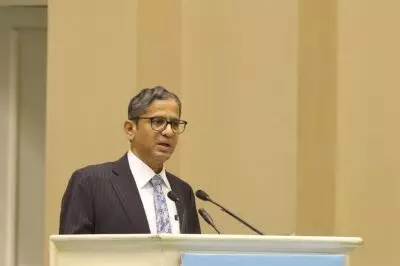
Lack of assessment of legislature of laws it passes leads to big issues: CJI
text_fieldsChief Justice of India NV Ramana on Saturday noted that the legislature does not assess the impact of the laws that it passes. This sometimes leads to big issues, he observed. The CJI was speaking on the second day of the valedictory ceremony of Constitution Day celebrations organised by the Supreme Court.
"The legislature does not conduct studies or assess the impact of the laws that it passes. This sometimes leads to big issues. The introduction of Section 138 of the Negotiable Instruments Act is an example of this. Now, the already burdened magistrates are further burdened by thousands of these cases," he said.
Regarding pendency, he remarked that rebranding existing courts as commercial courts without creating special infrastructure would not have any impact. "Therefore, the issue of pendency is multifaceted in nature. I hope the government takes into consideration the suggestions received during these two days and resolves the prevailing issues", said Justice Ramana.
Referring to Attorney General KK Venugopal's suggestions on the first day of the event, he said, "While highlighting the issue of judicial pendency, he proposed the restructuring of the judicial system and altering the hierarchy of the Courts. This is something that merits consideration by the government."
Many believe that the courts make laws, remarked Justice Ramana. These misconceptions must be cleared, he added. "Another set of misunderstandings relate to the belief that the Courts are responsible for liberal acquittals and adjournments. However, the truth is that the public prosecutors, advocates and parties - all have to co-operate with the judicial process. Non-cooperation, procedural lapses and faulty investigation cannot be blamed on Courts", he explained.
Countering the law minister's claims that the government has been allocating substantial amounts to the judiciary, Justice Ramana said that funds are not the problem but that some states are not coming forward to match the grants, leading to underutilisation of funds. "As a result, the central funds largely remain unutilised. That is the reason why I am proposing a special purpose vehicle of Judicial Infrastructure of Authority. I beseech the minister to take this proposal to logical conclusion. I also urge the minister to expedite the process of filling judicial vacancies", said Justice Ramana.
The boundaries drawn by the constitution are sacrosanct, the CJI emphasised on Friday. "But, there are times when courts are compelled to pay attention to unresolved grievances in the interest of justice. The intention behind such limited judicial interventions is to nudge the executive and not to usurp its role. The Constitutional obligation and duty of the judiciary to intervene needs to be appreciated in this context", he said.
























